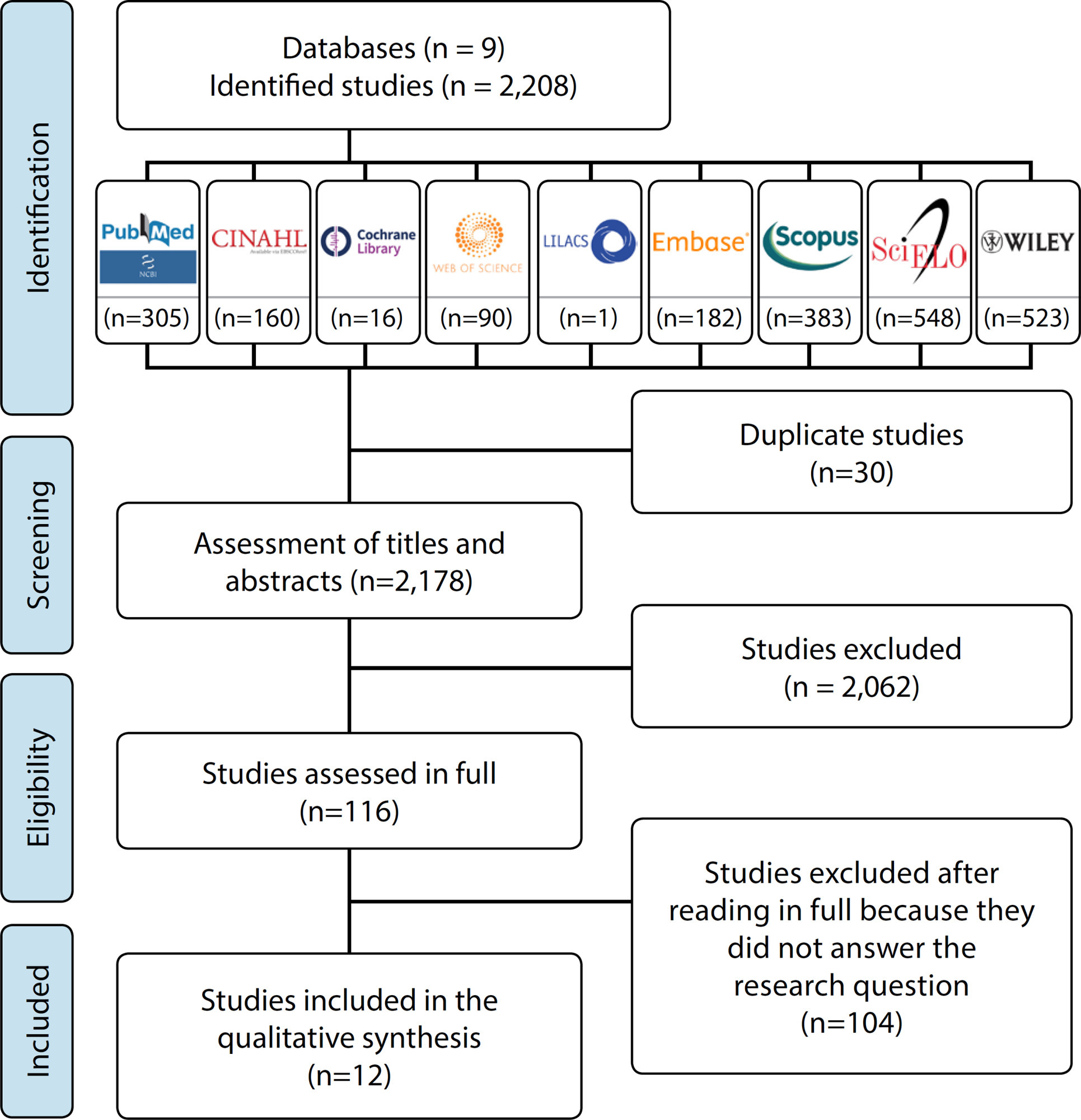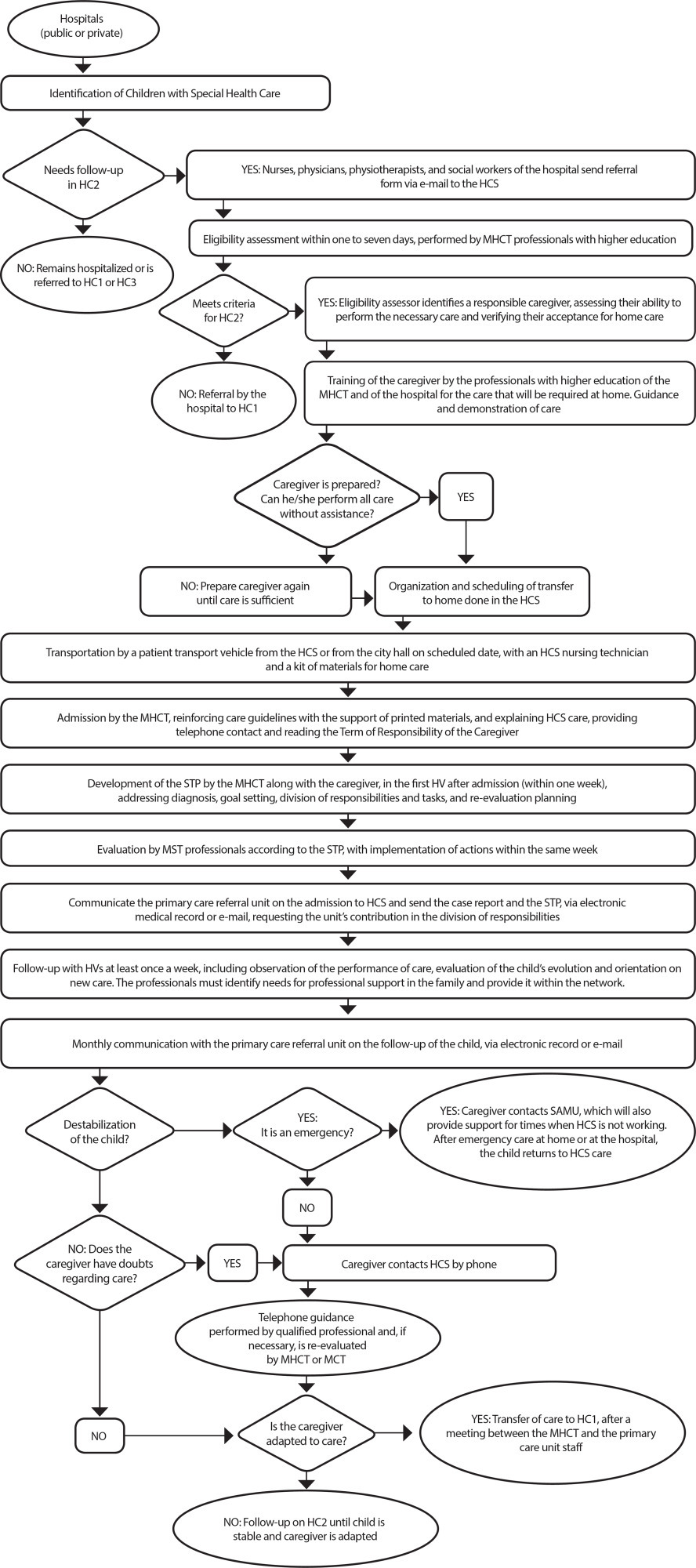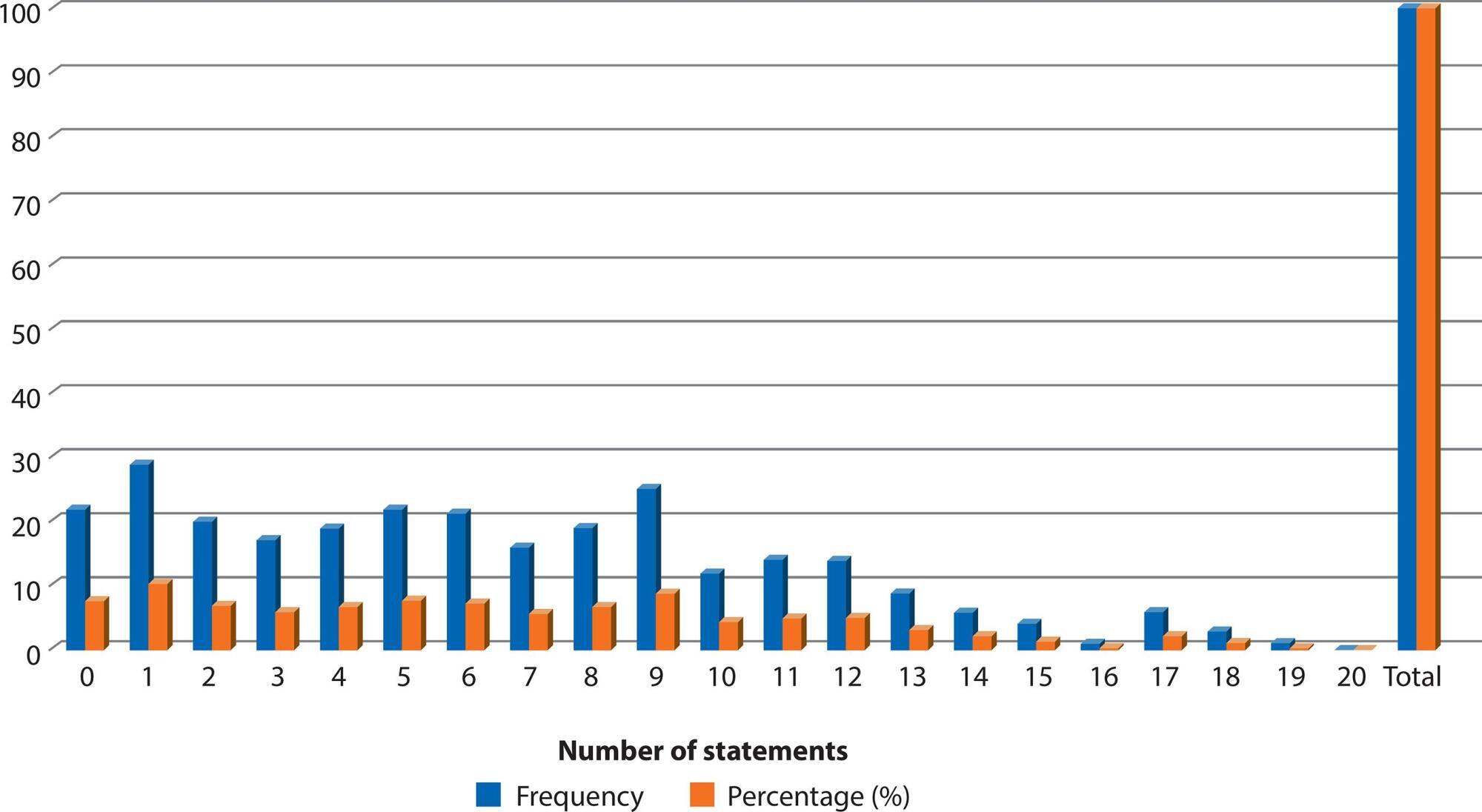-
ORIGINAL ARTICLE10-06-2023
Effect of guided imagery relaxation on anxiety in cervical cancer: randomized clinical trial
Revista Brasileira de Enfermagem. 2023;76(5):e20210874
Abstract
ORIGINAL ARTICLEEffect of guided imagery relaxation on anxiety in cervical cancer: randomized clinical trial
Revista Brasileira de Enfermagem. 2023;76(5):e20210874
DOI 10.1590/0034-7167-2021-0874
Views0See moreABSTRACT
Objectives:
to evaluate the effect of guided imagery relaxation through virtual reality on anxiety in women with cervical cancer undergoing radiochemotherapy.
Methods:
randomized, non-blinded, single-center clinical trial conducted at a cancer reference hospital. 52 women participated, with randomized allocation of 24 in the control group and 28 in the experimental group (12 sessions of guided imagery relaxation through virtual reality, applied three times a week). The outcome was evaluated using the State-Trait Anxiety Inventory and statistical analysis was performed using the Generalized Linear Mixed Model.
Results:
n the experimental group, women presented significant anxiety traits (p=0.010) before the intervention. Between the 4th and 12th week of follow-up, there was a reduction in anxiety levels, without statistical significance.
Conclusions:
guided imagery relaxation through virtual reality provided evidence of anxiety reduction in women with cervical cancer undergoing radiochemotherapy and may contribute to clinical practice. Brazilian Clinical Trial Registry: RBR-7ssvytb.

-
10-06-2023
Pesquisa Translacional em Saúde: para onde vamos?
Revista Brasileira de Enfermagem. 2023;76(5):e760501
Abstract
Pesquisa Translacional em Saúde: para onde vamos?
Revista Brasileira de Enfermagem. 2023;76(5):e760501
DOI 10.1590/0034-7167.2023760501pt
Views0Os contributos das pesquisas científicas são incontestáveis para o avanço da ciência e para a sociedade. Por isso, cada vez mais reflexões acerca dos impactos e da aplicabilidade dos estudos têm permeado o centro das discussões em nível global, sobretudo diante do aumento crescente da produção de conhecimentos. Nesse cenário, a translação da pesquisa (TP) […]See more -
10-06-2023
Ethical dilemmas and illicit acts in nursing: reflections on the legal (dis)order
Revista Brasileira de Enfermagem. 2023;76:e20220558
Abstract
Ethical dilemmas and illicit acts in nursing: reflections on the legal (dis)order
Revista Brasileira de Enfermagem. 2023;76:e20220558
DOI 10.1590/0034-7167-2022-0558
Views0See moreABSTRACT
Objectives:
to reflect on aspects of the legal system that involve situations of ethical dilemmas and illegal acts applied in legal proceedings related to nursing professionals.
Methods:
theoretical-reflective essay anchored in conceptions issued by a Brazilian nursing class body, based on technical opinions, in articulation with examples extracted from judges of the Superior Court of Justice.
Results:
the legal sources demonstrated the need to support nursing practices through a due and clear understanding of the notions addressed. Indeed, ethical dilemmas linked to professional practice usually refer to the psychological impact of having to act differently from what feels morally, ethically, or professionally appropriate.
Final Considerations:
the reflection was guided by conceptual and legal issues involving nursing practice, pointing to the need to monitor the effects of legal disorder caused by current legislation, which may have implications for the legal security of professionals.
-
ORIGINAL ARTICLE10-06-2023
Nursing students’ professional values for reinforcing the professional identity
Revista Brasileira de Enfermagem. 2023;76:e20220338
Abstract
ORIGINAL ARTICLENursing students’ professional values for reinforcing the professional identity
Revista Brasileira de Enfermagem. 2023;76:e20220338
DOI 10.1590/0034-7167-2022-0338
Views0See moreABSTRACT
Objectives:
to understand the nursing students’ professional values in different Brazilian universities and verify a correlation between the “Professional Value” and the sociodemographic variables.
Methods:
quantitative, cross-sectional, and descriptive study conducted through an electronic questionnaire with a Professional Values Scale (NPVS-3). Participants were Nursing students of all semesters from three universities – two in the Southeast region and one in the North region.
Results:
of the 337 participating Nursing students, 282 were female. The Caring dimension presented the highest score (mean=46.61), and Professionalism, the lowest score (mean=34.65). A statistically significant association was detected between the Caring dimension, “university where is attending,” and “gender.”
Conclusions:
the results indicate the Caring dimension as the one containing the most scored professional values since the nurses’ training, and the relation of those values in such dimension is more significant in the female sample.
-
ORIGINAL ARTICLE10-06-2023
Ethical problems in nursing teleconsultations for people living with HIV during the Covid-19 pandemic
Revista Brasileira de Enfermagem. 2023;76:e20220754
Abstract
ORIGINAL ARTICLEEthical problems in nursing teleconsultations for people living with HIV during the Covid-19 pandemic
Revista Brasileira de Enfermagem. 2023;76:e20220754
DOI 10.1590/0034-7167-2022-0754
Views0See moreABSTRACT
Objectives:
to understand the ethical problems experienced by primary health care nurses in using nursing teleconsultations for people living with the human immunodeficiency virus during the coronavirus pandemic.
Methods:
qualitative research, anchored in Constructivist Grounded Theory. Data was collected between July and September 2020, with 17 participants.
Results:
the first category highlights the ethical problems in conducting teleconsultations, managing high demand, communication barriers, and risks related to data security. The second emphasizes the potential of teleconsultations in communication and access, by generating changes in the work process and the use of protocols to guide clinical practice.
Conclusions:
nurses’ work in digital mode requires professional qualification, with a view to stimulating reflection on teleconsultation practice, ethical-moral deliberation and combating stigma, and also adopting data security-centered conduct.
-
09-25-2023
Artificial intelligence as an ally in Brazilian nursing: challenges, opportunities and professional responsibility
Revista Brasileira de Enfermagem. 2023;76(3):e760301
Abstract
Artificial intelligence as an ally in Brazilian nursing: challenges, opportunities and professional responsibility
Revista Brasileira de Enfermagem. 2023;76(3):e760301
DOI 10.1590/0034-7167.2023760301
Views0The current state of nursing in Brazil presents complex challenges and opportunities that require innovative solutions. In this context, artificial intelligence (AI) emerges as a promising tool to address these challenges and seize opportunities. In particular, natural language processing models, such as OpenAI’s ChatGPT, demonstrate the potential to be valuable resources for nurses at all […]See more -
09-25-2023
A inteligência artificial como aliada na enfermagem brasileira: desafios, oportunidades e responsabilidade profissional
Revista Brasileira de Enfermagem. 2023;76(3):e760301
Abstract
A inteligência artificial como aliada na enfermagem brasileira: desafios, oportunidades e responsabilidade profissional
Revista Brasileira de Enfermagem. 2023;76(3):e760301
DOI 10.1590/0034-7167.2023760301pt
Views0O estado atual da enfermagem no Brasil apresenta desafios e oportunidades complexas que requerem soluções inovadoras. Nesse contexto, a inteligência artificial (IA) surge como uma ferramenta promissora para enfrentar esses desafios e aproveitar as oportunidades. Em particular, os modelos de processamento de linguagem natural, como o ChatGPT da OpenAI, demonstram potencial para serem recursos valiosos […]See more -
ORIGINAL ARTICLE09-18-2023
Vaccination coverage in children under one year of age and associated socioeconomic factors: maps of spatial heterogeneity
Revista Brasileira de Enfermagem. 2023;76(4):e20220734
Abstract
ORIGINAL ARTICLEVaccination coverage in children under one year of age and associated socioeconomic factors: maps of spatial heterogeneity
Revista Brasileira de Enfermagem. 2023;76(4):e20220734
DOI 10.1590/0034-7167-2022-0734
Views0See moreABSTRACT
Objective:
to analyze vaccination coverage spatial distribution in children under one year old and the socioeconomic factors associated with meeting the recommended goals in Minas Gerais.
Methods:
an ecological study, carried out in 853 municipalities in the state. Pentavalent, poliomyelitis, meningococcal conjugate, yellow fever, rotavirus, and 10-valent pneumococcal conjugate vaccination coverage were analyzed. Scan statistics and multiple logistic regression were performed to identify spatial clusters and factors associated with meeting coverage goals.
Results:
spatial analysis revealed clusters with risk of low coverage for all vaccines. Number of families with per capita income of up to 1/2 wage, Minas Gerais Social Responsibility Index and percentage of the poor or extremely poor population were associated with meeting the established goals.
Conclusions:
the results are useful for designing interventions regarding the structuring of vaccination services and the implementation of actions to increase vaccination coverage in clusters with less propensity to vaccinate.

-
ORIGINAL ARTICLE03-17-2023
Production and validation of an educational video on the use of the Z-Track Technique
Revista Brasileira de Enfermagem. 2023;76(2):e20220439
Abstract
ORIGINAL ARTICLEProduction and validation of an educational video on the use of the Z-Track Technique
Revista Brasileira de Enfermagem. 2023;76(2):e20220439
DOI 10.1590/0034-7167-2022-0439
Views0See moreABSTRACT
Objective:
to create and validate an educational video on intramuscular drug administration using the Z-track technique.
Methods:
the Delphi Technique was used to validate the script. PhDs in Nursing and PhDs in Social Communication with experience in the production of educational videos participated in the process. After editing, the video was validated by three nursing professors and assessed by students of the undergraduate nursing program at a public university.
Results:
the video was validated by the examiners with 100% agreement in three rounds for script validation and in two for video validation after editing. The duration of the video was 9 minutes.
Conclusion:
after validation by the examiners, students assessed the video and considered it suitable for learning. We This video is expected to aid in the training of nursing professionals and the enhancement of patient care.
-
ORIGINAL ARTICLE10-21-2019
Social determinants of health and vulnerabilities to sexually transmitted infections in adolescents
Revista Brasileira de Enfermagem. 2019;72(6):1595-1601
Abstract
ORIGINAL ARTICLESocial determinants of health and vulnerabilities to sexually transmitted infections in adolescents
Revista Brasileira de Enfermagem. 2019;72(6):1595-1601
DOI 10.1590/0034-7167-2018-0726
Views1See moreABSTRACT
Objective:
To verify the association between social determinants of health and the vulnerability of adolescents to Sexually Transmitted Infections (STIs).
Method:
Cross-sectional study, performed with 287 students aged 11 to 17 years, in the outskirts of Fortaleza, Ceará, Brazil, from August do September 2016. Two instruments were used, one destined to social determinants of health and another to investigating the vulnerability to STIs. The magnitude of associations was expressed through odds ratio and interval of confidence, considering a 5% significance level. This research was approved by the Research Ethics Committee of the Federal University of Ceará.
Results:
212 (73.9%) adolescents were considered more vulnerable, with a score ≥ 4. The intermediate social determinant “housing (home ownership)” obtained significant association with with the vulnerability to STIs (p of 0.022; CI 1.1 to 3.3; OR 1.9).
Conclusion:
The intermediate social determinant “type of housing” influences the vulnerability to STAs.
-
REVIEW09-06-2022
Biosafety measures to prevent COVID-19 in healthcare professionals: an integrative review
Revista Brasileira de Enfermagem. 2022;75(1):e20201191
Abstract
REVIEWBiosafety measures to prevent COVID-19 in healthcare professionals: an integrative review
Revista Brasileira de Enfermagem. 2022;75(1):e20201191
DOI 10.1590/0034-7167-2020-1191
Views0See moreABSTRACT
Objective:
to identify the main biosafety measures for preventing COVID-19 in healthcare professionals.
Methods:
this is an integrative literature review, with studies published between January and July 2020, on the MEDLINE/PubMed, Scopus, Embase, Web of Science, LILACS, SciELo, Wiley Online Library, Cochrane CINAHL databases. The selection of studies followed the PRISMA recommendations.
Results:
among the 2,208 publications identified, 12 studies comprised the sample, which enabled the analysis in four thematic categories: The importance of using recommendations about the use of personal protective equipment; The restructuring of new operational and clinical routines and flows in the practice of services; Monitoring professionals, especially testing; Conducting training.
Conclusions:
the phenomena involved are innumerable, covering operational management and the training of teams to deal with highly infectious pathogens and disease outbreaks.

-
ORIGINAL ARTICLE09-21-2020
Organizational flow chart of home care for children with special health care needs
Revista Brasileira de Enfermagem. 2020;73:e20190310
Abstract
ORIGINAL ARTICLEOrganizational flow chart of home care for children with special health care needs
Revista Brasileira de Enfermagem. 2020;73:e20190310
DOI 10.1590/0034-7167-2019-0310
Views0See moreABSTRACT
Objective:
To develop a workflow protocol for Home Care (HC) services in the HC2 modality for children with special health care needs (CSHCN) in the state of Parana.
Method:
Quantitative, descriptive, exploratory, multiple case studies. Data was collected with professionals from the eight home care services in Parana. Data were analyzed using the Strengths, Weaknesses, Opportunities and Threats (SWOT) methodology, from which a 5W2H method of action plan was developed, resulting in a flow chart.
Results:
Considering the strategies found in Home Care services, such as planned hospital discharge, caregiver training, organized transportation and singular therapeutic project, a flow organization protocol for children with special health care needs in Home Care services was developed.
Conclusion:
The protocol developed makes it possible to organize the care provided to children with special health care needs in home care.

-
EXPERIENCE REPORT12-04-2020
COVID-19 pandemic: report on the use of auriculotherapy to optimize emergency workers’ health
Revista Brasileira de Enfermagem. 2020;73:e20200507
Abstract
EXPERIENCE REPORTCOVID-19 pandemic: report on the use of auriculotherapy to optimize emergency workers’ health
Revista Brasileira de Enfermagem. 2020;73:e20200507
DOI 10.1590/0034-7167-2020-0507
Views0See moreABSTRACT
Objective:
To report the use of auriculotherapy to optimize emergency workers’ health during the COVID-19 pandemic.
Methods:
Experience report of auriculotherapy application in 48 workers of a mobile emergency care service center located in a city in the Northeast of Brazil.
Results:
Six auriculotherapy sessions were held, each lasting eight minutes, based on specific protocols in the area and Chinese energy physiology. The aim of the practice was to contribute to the improvement of physical (pain) and emotional (anxiety, stress) symptoms, and the promotion of greater health and willingness to work. In addition, the experimentation of this practice was thought of as a pilot for the creation of a care service for workers.
Final Considerations:
In the report of auriculotherapy, the description of its application and its positive and negative points in relation to professionals working in the pandemic scenario were considered and its continuity was requested.

-
ORIGINAL ARTICLE02-10-2020
Common mental disorders in nursing technicians of a university hospital
Revista Brasileira de Enfermagem. 2020;73(1):e20180513
Abstract
ORIGINAL ARTICLECommon mental disorders in nursing technicians of a university hospital
Revista Brasileira de Enfermagem. 2020;73(1):e20180513
DOI 10.1590/0034-7167-2018-0513
Views0See moreABSTRACT
Objective:
To verify the prevalence of common mental disorders and associated factors in nursing technicians.
Method:
Cross-sectional analytical study conducted at a university hospital. A questionnaire with sociodemographic, educational and work-related variables and the Self Reporting Questionnaire-20 were used to verify the presence of common mental disorders. Association analysis was performed using the chi-squared test, with a significance level of 5%.
Results:
280 nursing technicians participated in the study. The prevalence of common mental disorders was 46.9%. The variables family income (p=0.021) and working exclusively in health area (p<0.001) were associated with the outcome. There was a higher prevalence of CMD among individuals with a family income below four minimum wages (PR=1.41) and among professionals who worked exclusively in the health area (PR=1.95).
Conclusion:
Approximately half of the nursing technicians of the university hospital presented common mental disorders, which were associated with economic and work-related variables.

-
ORIGINAL ARTICLE02-10-2020
Relationship between quality of life, self-esteem and depression in people after kidney transplantation
Revista Brasileira de Enfermagem. 2020;73(1):e20180245
Abstract
ORIGINAL ARTICLERelationship between quality of life, self-esteem and depression in people after kidney transplantation
Revista Brasileira de Enfermagem. 2020;73(1):e20180245
DOI 10.1590/0034-7167-2018-0245
Views0See moreABSTRACT
Objective:
to assess the relationship between health-related quality of life with depression and self-esteem of people after kidney transplantation.
Method:
a cross-sectional study of 47 outpatients from October 2016 to February 2017. The following tools were applied: The Medical Outcomes Study 36-Item Short-Form Health Survey, Beck Depression Inventory and Rosenberg Self-Esteem Scale. Descriptive statistics and Spearman correlation were used.
Results:
women had lower scores for health-related quality of life. Young adults, people with up to one and a half years of transplantation and those who had dialysis for more than one year had higher scores.
Conclusion:
the health-related quality of life of people with chronic kidney disease after transplantation ranged from good to excellent. The presence of depression was not identified. The relationship of data indicates that the higher the quality of life, the better the self-esteem assessment.
-
ORIGINAL ARTICLE05-21-2021
Adherence of the nursing team to patient safety actions in neonatal units
Revista Brasileira de Enfermagem. 2021;74(2):e20200765
Abstract
ORIGINAL ARTICLEAdherence of the nursing team to patient safety actions in neonatal units
Revista Brasileira de Enfermagem. 2021;74(2):e20200765
DOI 10.1590/0034-7167-2020-0765
Views1See moreABSTRACT
Objectives:
to describe the nursing team’s adherence to patient safety actions in neonatal units using a validated instrument.
Methods:
a cross-sectional study, carried out through direct observation of the nursing team and descriptive analysis of 182 records of the “Checklist for patient safety in nursing care during hospitalization in Neonatal Intensive Care Units” in a hospital in the municipality of Belo Horizonte.
Results:
there was evidence of adherence greater than 90.0% in the units concerning the use of the identification wristband and guidance of the companions. It was identified 79.0% of absence on the checking of wristband identification and 59.0% of the absence of an evaluation of the crib wheels’ locks. Three of the 21 items included in the checklist did not show non-conformities.
Conclusions:
partial adherence to patient safety actions was observed, especially regarding the target of patient identification and prevention of falls, which exposes newborns to preventable adverse events.
Search
Search in:
Nuvem de Tags
Adolescente (85) Atenção Primária à Saúde (239) COVID-19 (91) Criança (91) Cuidados de Enfermagem (269) Educação em Enfermagem (151) Educação em Saúde (139) Enfermagem (930) Enfermagem Pediátrica (86) Estudantes de Enfermagem (77) Estudos de Validação (131) Família (87) Idoso (208) Promoção da Saúde (99) Qualidade de Vida (104) Saúde do Trabalhador (86) Saúde Mental (145) Saúde Pública (82) Segurança do Paciente (150) Tecnologia Educacional (100)



